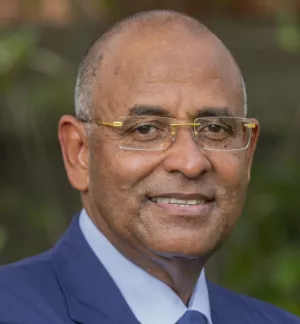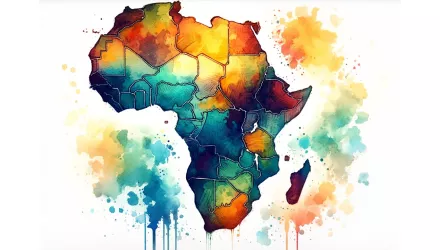Politics and Prosperity: Examining Economic Development in Africa
Session 3 of the Africa Beyond the Headlines study group
Session 3 of the Africa Beyond the Headlines study group
Related Programs
Over the course of five sessions, this study group, led by Dr. Gloria Ayee, is exploring the pivotal moment experienced by the African continent. With youthful populations, abundant resources, and growing economic and technological capacity, Africa holds solutions to global challenges from food security to climate change. Participants of the study group are invited to reflect on the role that international cooperation must play in supporting inclusive, sustainable development in Africa, as well as to move beyond outdated perspectives and learn about Africa’s profound transformation through trade, investments in clean energy and health, and youth empowerment initiatives. Participants are also given the opportunity to prepare one policy memo on a topic related to one of the sessions and to provide a memo briefing the study group and to a relevant external expert guest.
On April 9, the study group met for the third time to examine economic development in Africa. The group explored connections between politics and economic growth trajectories across the continent, and analyzed the role of political instability and policy decisions in fostering development. Discussions covered the impact of factors like commodity markets, foreign aid, trade deals, and regional integration initiatives on development indicators. The study group counted with the presence of external expert guest H.E. Patrick Achi, former Prime Minister of Côte d’Ivoire. Prime Minister Achi shared about his experience at the highest level of government and presented the story of Côte d’Ivoire’s post-independence development as a microcosm of the broader challenges and opportunities facing African nations.
The journey of economic development in the African continent offers valuable lessons on the interplay between political stability, economic policy, and international collaboration. The experience of Côte d’Ivoire’s post-independence trajectory best exemplifies this interplay, highlighting how early leadership with a clear vision for development can spur growth. Under President Houphouët-Boigny’s governments, Côte d’Ivoire’s economic success became known as the “Ivorian miracle”. However, following his death, the country suffered from a devaluation of the CFA franc and an economic recession which ultimately led to a number of coups and a civil war that began in 2002. In this regard, the experience of Côte d’Ivoire serves as a cautionary tale of how political instability can undo decades of progress, underscoring the critical need for stable governance as a foundation for economic prosperity across Africa.
Conflicts have hindered development efforts in many African countries. These are often rooted in political and ideological differences, but capitalize on the economic challenges faced by populations. In this regard, the interconnection between economic despair and security challenges, including terrorism, is evident across the continent. Strategies to combat these issues must rely on holistic economic development and on creating a stable environment where basic needs are met. Such strategies transcend political divides, prioritizing unified efforts towards poverty alleviation and improved living standards.
Infrastructure development and economic integration are vital for the continent's growth, not least as a means towards increased trade and cooperation between African countries. Côte d'Ivoire's story reflects the broader necessity for African nations to prioritize pragmatic regional cooperation over ideological divisions to achieve sustainable economic advancement. Similarly, the complex dynamics between African countries and international partners, such as the United States, influence economic development. In this regard, the experience of African nations highlights the importance of forging equitable and mutually beneficial partnerships in order to avoid resentment or feeding into a growing sense of selfish diplomacy. The nuanced dynamics of geopolitical influence further point to an increasing threat of Russian influence and propaganda, undermining democratic processes, particularly in the Sahel.
The agricultural sector offers significant potential for economic development. Lessons from Côte d'Ivoire's cacao industry underscore the necessity of modernization, stability, and supportive policies to enhance productivity and economic growth in African nations. This can not only serve to address the critical need for food security, but also to utilize the potential of a wealth of natural resources in the form of arable land and favorable climate conditions. Furthermore, climate change poses a unique set of challenges for African countries while still presenting opportunities for development. Effective management of environmental issues, coupled with the leveraging international support for sustainable development in the form of climate financing, is essential for the continent’s future.
The path to transforming African economies requires a comprehensive approach that includes fostering political stability, encouraging economic development, enhancing regional cooperation, and navigating international relations with strategic autonomy. The experiences of individual countries like Côte d'Ivoire serve as both warnings and guides for the continent. A unified commitment to development, both from within and from the diaspora, alongside collaboration between the public and private sectors, can drive African countries towards a stable and prosperous future.
Martín Rodríguez , Alejandro. “Politics and Prosperity: Examining Economic Development in Africa.” Belfer Center for Science and International Affairs, Harvard Kennedy School, April 11, 2024
Politics and Prosperity: Examining Economic Development in Africa
Martín Rodríguez , Alejandro. “Politics and Prosperity: Examining Economic Development in Africa.” Belfer Center for Science and International Affairs, Harvard Kennedy School, April 11, 2024


From Africa Futures Project
